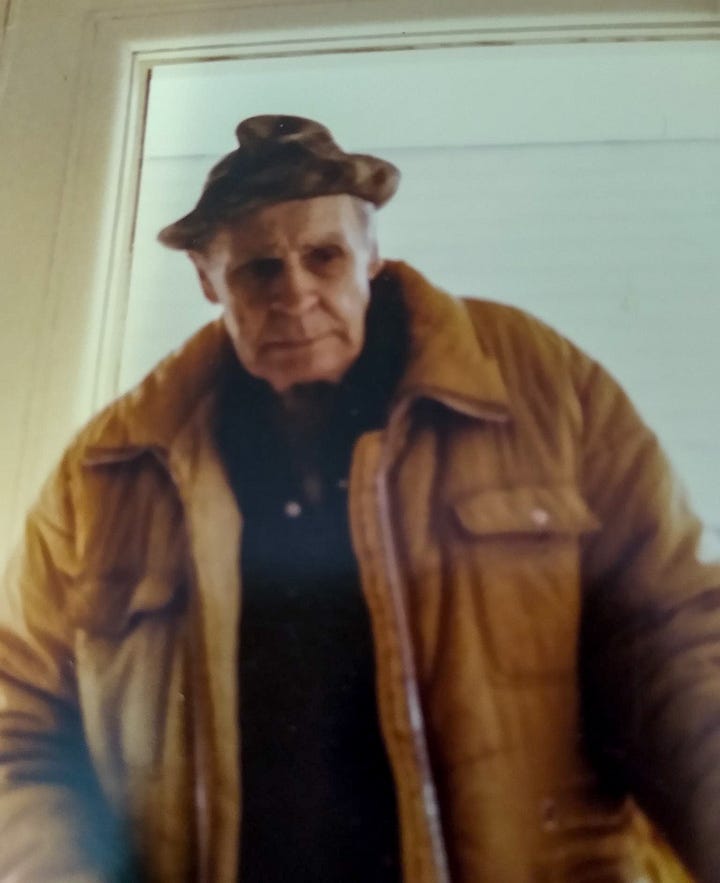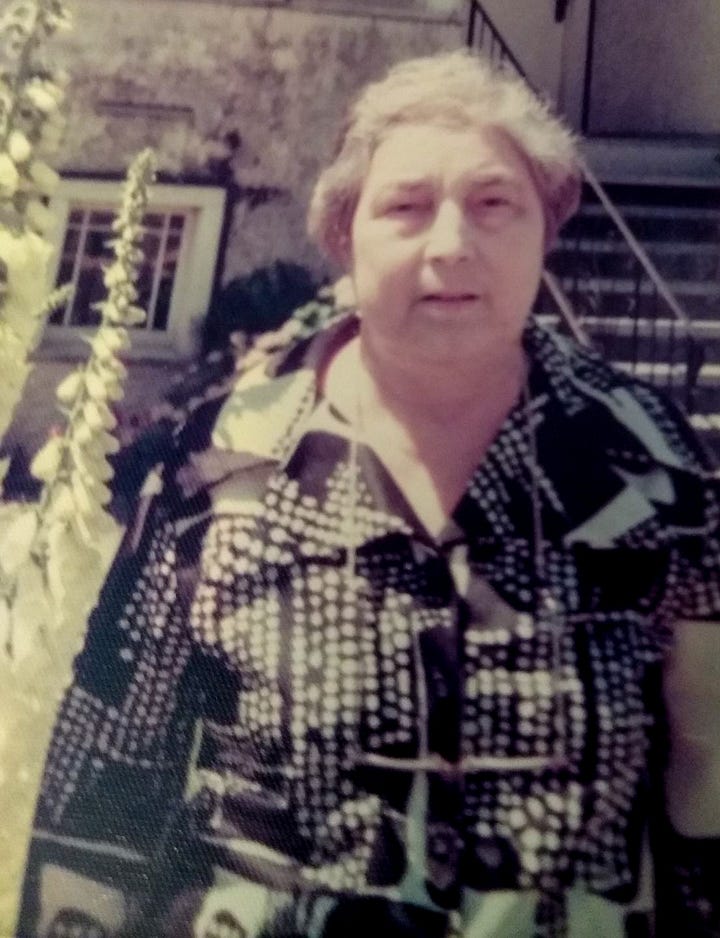Chapter 12 - Prepared for Anything
Nursing at a Remote Cannery in British Columbia
Previous chapter / Next chapter / Start at the beginning
Trish pulled on her jacket and shoes, before grabbing the bag she had prepared for house calls. It was late at night, and just minutes before, a young boy had banged on the door of Bill and Norah’s house. He had come to tell Trish she was needed in the village. By day, kids were not permitted past the boardwalk into the cannery area, but at night, in an emergency, a family might send their child to fetch Trish because someone had fallen ill.
By the time Trish stepped out of the front door into the night, the boy was long gone. She was alone as she started down the long, dark boardwalk to the village. This was her first trip to the village at night. She wasn’t worried about getting lost; the boardwalk ensured she was going the right way. It was the darkness that was unsettling. It was so dark it felt like a weight. Trish had a small flashlight she used to light the ground immediately in front of her, its beam swallowed up by the darkness just ahead.
As her flashlight cast its rays ahead of her on the boardwalk, suddenly, a loud swooshing sound accompanied a blast of wind that lifted her hair. Trish froze in her tracks, an unearthly vision before her. She was certain she saw shadowed forms rising in the darkness. She stood motionless. It was spooky, terrifying even.
As her adrenaline subsided, she realized what had given her such a fright. Ravens, some as big as chickens, roosted on the railing of the boardwalk at night. Her flashlight had disturbed them, and they rose off the railing. They settled again after she moved on.
In the coming weeks, even as she expected the ravens to be there, she was on edge whenever she had to make her way to the village at night. In time, one dog on the site befriended Trish, and would trot along beside her as she moved through her workday. He would also accompany her at night when she needed to make a trip into the village, which she appreciated.
Those first weeks of work in Namu were a shocking experience for Trish. She had come from a big city, working as part of a team in a large hospital to a remote worksite in the wilderness to operate a tiny, un-stocked clinic, where she was completely on her own. As those thoughts ran through her mind, a more powerful thought came to her. She had been trained well, and she was being decisive, even in very unfamiliar surroundings and circumstances. She decided which patients she could manage, and which needed to be sent to Bella Bella. The ones she managed in the clinic, she diagnosed their ailments and started their treatments. She had quickly developed a good rapport with Dr. Henderson in Bella Bella. She was a good nurse. The realization helped her approach new and unexpected situations with a clear head, and confidence in her skills.
Although the clinic sat next to the RCMP office on the big wharf, Trish saw little of the police officer posted there. He rarely poked his head into the clinic, though he was pleasant enough when they crossed paths. On one occasion, though, Trish needed his help.
It was a weekend evening, and Trish was already home for the night. A knock at the door suggested the evening was about to take a turn. One of the cannery staff was on the doorstep, he told Trish someone had cut himself, and she needed to come stitch him up. Trish quickly put her uniform back on and went straight to the clinic. As she approached, she saw two men, struggling to drag along a third, a European-sounding man she hadn’t seen before, toward the clinic door. The man was very inebriated, struggling against his would-be rescuers, and covered in an alarming amount of blood from his waist down. Trish quickly unlocked the door and scooted inside ahead of the trio of men. The rescuers, still struggling to restrain the injured man, told Trish they had seen him stumbling around with a bottle of whiskey in the back pocket of his jeans, and he had fallen on it. He had a deep laceration on his backside. He also wanted nothing to do with receiving any help for it. One of the men who had brought him in went to get the police officer. They needed all the help they could get to hold the fellow down so Trish could look after the wound. As soon as the patient saw the officer, he amplified his struggle, drunkenly swinging his fists around. His attempted punches were ineffective, but they added an extra element of risk to everyone involved.
After an extended skirmish, the officer and the other men held the patient down with great difficulty, while Trish sutured the laceration. It was deep; he had lost a lot of blood. Trish didn’t think they could manage him overnight at the clinic in his agitated state. She wanted to send him to Bella Bella on a fishing boat. The owner of the boat said he would take him only if Trish and the officer went too. There wasn’t another option, so they loaded the fellow onto the boat, the officer still ducking the wild drunken punches, and they set off. The fisherman stared straight ahead, never turning his head for the entire trip, despite the obvious sounds of the ongoing fracas behind him. Trish and the officer struggled for the entire trip, trying to contain the patient, who was still trying to slug anyone near him. A few days later, when the man sobered up and returned to Namu, Trish barely recognized him. He seemed to be a very nice man who expressed deep embarrassment about his drunken behaviour.
In contrast to the unexpected and challenging work at the clinic, evenings spent with Bill and Norah in their little house were calm and pleasant. They chatted, and Norah taught Trish some ways they preserved food as they prepared to stay in Namu over the winter. Trish learned how to use a pressure cooker to can fish and fruits. Norah also showed her how to hook rugs. Norah made large, colourful area rugs by latch-hooking short lengths of yarn through mesh canvas. Trish enjoyed the repetitive action of hooking a rug, one small piece of yarn at a time. It was a relaxing activity to do, while visiting with Bill and Norah in the evenings.


By the first week of September, Trish had spent five weeks in Namu. The cannery’s work was winding down for the season, and the workers were preparing to return to Bella Bella and surrounding villages for the winter. Trish would leave with them. Reflecting on her time there, she realized how those five weeks had felt much longer because every day yielded so many new experiences.
On her final day, Trish closed the clinic door for the last time, leaving it ready for the next season. She went to collect her belongings from Bill and Norah’s home, and to say goodbye to her hosts. They had become family in the short time she stayed with them; she knew they would stay in touch.
At the wharf, people and supplies were being loaded onto fishboats. Ronnie was there, too. He thanked Trish for her work at Namu and wished her well in Bella Bella, pointing out the boat she would travel on. Trish thanked him, and climbed aboard, joining families and their belongings, all bound for Bella Bella.
Once the boat was fully loaded, the engines came to life with a now-familiar rumble. The smell of exhaust mixed with the salty tang of the saltchuck, and the scent of the cannery itself, filled her nostrils for the last time. As the boat pulled away, she watched the cannery shrink into the distance and wondered what was waiting for her in Bella Bella.
Previous chapter / Next chapter / Start at the beginning
If you are enjoying reading Trish’s story, please consider supporting my work by buying me a coffee.
Coffee makes the world go round, and the words flow, as they say!
Author’s Notes
N.B.1: In 1970, as Trish was introduced to the people of Namu, Bella Bella, and other communities where she worked, the language of the time, “Natives”, was used. Today, the people living on the lands where Trish worked, have reclaimed their traditional identities, leaving behind the nomenclature assigned them during colonization.
Namu and Bella Bella sit on the traditional territories of the Heiltsuk Nation. Workers came each summer to Namu from Bella Bella and surrounding territories including, but not limited to Klemtu, the home of the Kitasoo Xai'xais Nation, and from River’s Inlet, home of the Wuikinuxv Nation.
If you would like to read more about the identity and culture of First Nations people in Canada, including insights from Indigenous authors and advisors, here is a resource from the “First Nations & Indigenous Studies” program at the University of British Columbia.
N.B.2: We often see our parents through the lens of their roles in our lives— caregivers, disciplinarians, cheerleaders. Perhaps they are our role models or mentors, but who were they before they became these things to us?"
To better understand who my parents were before they were, well, my parents, I set about interviewing them about their lives before marriage and kids. I started with my mom.
Trish Lewis was 18 years old and desperate to escape a mind-numbing administrative job at a factory in Liverpool in the 1950’s. She made the impulsive decision to join a friend to interview for nurse’s aide training at Alder Hey Children’s Hospital. That decision changed the trajectory of her life and launched her into an interesting and rewarding career as a nurse.
Trish is my mom, and this is her story, as told to me in a series of interviews in 2024. The story is pieced together from Mom’s memory, photos, and documents. As we all know, memory is fallible. In the telling of this story, some names have been changed, either because they could not be recalled, or to protect the privacy of the person. The Journey is a reader-supported publication. To receive new posts and support my work, consider becoming a free or paid subscriber.
N.B.3: If you are enjoying this story, you may also enjoy reading my memoir, “Resilience in the Rubble: A True Tale of Aid and Survival in Kashmir”. The book shares my experience as a first-time medical aid worker in Azad Kashmir, Pakistan, after an earthquake devastated the region in 2005. It also tells the story of Nadeem Malik, a local teenager who lived through the earthquake, and his struggle to provide for his family in the aftermath.




